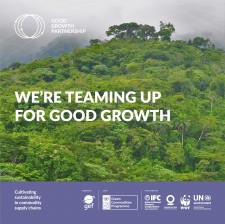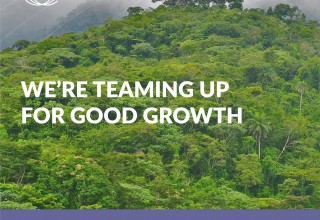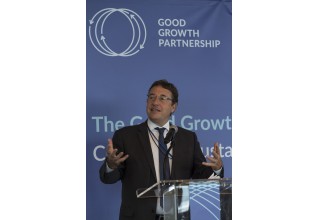Major Players Join Forces to Place Sustainability at the Heart of Global Commodity Supply Chains

NEW YORK, September 6, 2017 (Newswire.com) - In an effort to enable sustainable agriculture and reduce deforestation, some of the world’s largest conservation, development and finance organizations, as well as government representatives from major producer countries, gathered at the United Nations in New York today to launch the Good Growth Partnership.
Funded by the Global Environment Facility (GEF), the Good Growth Partnership will work with the governments of Brazil, Indonesia, Liberia, and Paraguay, as well as the private sector and civil society organizations to enable lasting, transformative change throughout three key global commodity supply chains: soy, beef and palm oil. Led by the UNDP’s Green Commodities Programme, the partnership will be implemented in collaboration with Conservation International, the International Finance Corporation, UN Environment and World Wildlife Fund.
“From my vantage point this initiative, the Good Growth Partnership, is long overdue. Agriculture in the 21st century is fundamental and foundational to our very existence but ironically it has become one of the biggest challenges we face in our pursuit toward sustainability and an inclusive green economy,” said UNDP Administrator Achim Steiner during his opening address at the launch.
"I want to thank our partners who have helped to make this partnership come alive, to thank all of you who have come together today to make this partnership possible and indeed a touchstone for many who are looking to change the markets of the future," added Mr. Steiner.
Coordinating and building on the partners’ expertise in the areas of sustainable finance, demand and production of agricultural commodities, the Good Growth Partnership will support governments to fortify their assistance to small-scale farmers and strengthen land use policies by convening industry stakeholders for national action. It will also focus on raising awareness to influence the global demand of sustainably produced agricultural commodities and supply chain transparency in addition to engaging the finance sector with new opportunities for investment.
“As demand for agricultural commodities grows, we need to develop forward-thinking business models to manage sustainable commodity production that also maintains forests and important ecosystem services," said Naoko Ishii, CEO and Chairperson of the Global Environment Facility at the U.N. launch.
“With its alliances and growing links to the private sector, the Good Growth Partnership is poised to help change commodity production pathways by placing long-term sustainability at the heart of the supply chain,” she further added.
OTHER QUOTES
Erik Solheim, the Executive Director of the United Nations Environment Programme —
"This collaborative work, encompassing demand, supply, and finance of commodities is a critical step towards safeguarding sustainable economies where people and nature can prosper together. The involvement of members of U.N. Environment’s Finance Initiative ensures that the finance industry is fully engaged in delivering this transformative change."
Jennifer Morris, President, Conservation International —
“CI works towards sustainable development that protects our planet and supports farmers. Agriculture is the largest single driver of deforestation, yet forests are critical in combating climate change – 30 percent of emissions reductions could come from the protection and restoration of forests while supporting growth in sustainable agriculture. Partnering with leaders across the environmental, conservation and business sectors is critical in meeting this pressing global challenge.”
Jason Clay, Senior Vice President of Markets and Food, WWF —
"We can meet growing demand for food while preserving forests and other critical habitats as well as the invaluable social, environmental, and economic services they provide. Through the Good Growth Partnership, the market has an opportunity to do so for this and future generations."
More information
Contact
Good Growth Partnership Communications Advisor Rebecca.lake@undp.org
In New York: Sangita Khadka, Communications Specialist, UNDP Bureau for Policy and Programme Support, sangita.khadka@undp.org, Tel: +1 212 906 5043
Editor’s Notes
Agriculture, Economic Growth and Deforestation
The commercial production of soy, beef and palm oil are a dominant economic force in many national and developing rural economies. Worldwide, the livelihoods of 2.5 billion people depend on agriculture.
However our growing global population, rising incomes and changing diets continue to increase demand for agricultural commodities and create more pressure on the planet’s finite natural resources.
As a result, agriculture is the largest single driver of deforestation in the world today. Land is cleared to produce commodities including palm oil, soy and beef that are the foundation of millions of products traded globally. It is estimated that commercial agriculture for these three commodities, plus timber and pulp, drives approximately 70 percent of tropical deforestation.
Sustainable Agriculture
To achieve more sustainable agriculture supply chains, a holistic and integrated approach must be adopted. This will require significant collaboration, financial investment into infrastructure as well as farmer training and support. It will also require coordinated national planning to reverse land degradation and implement responsible land use policies in addition to increased awareness, incentives and market demand for sustainably produced commodities.
About the UNDP Green Commodities Programme
As a trusted development partner, with a long-term presence in more than 170 countries, the United Nations Development Programme (UNDP) recognized that it could play a game-changing role at the national level to convene diverse commodity stakeholders and help create more enabling environments for sustainable commodity sectors to grow. In 2009, UNDP launched the Green Commodities Programme (GCP) to play this important role in countries where highly traded commodities are important pillars of national and local economies. Visit the Green Commodities Programme website for more information.
Source: UNDP Green Commodities Programme

